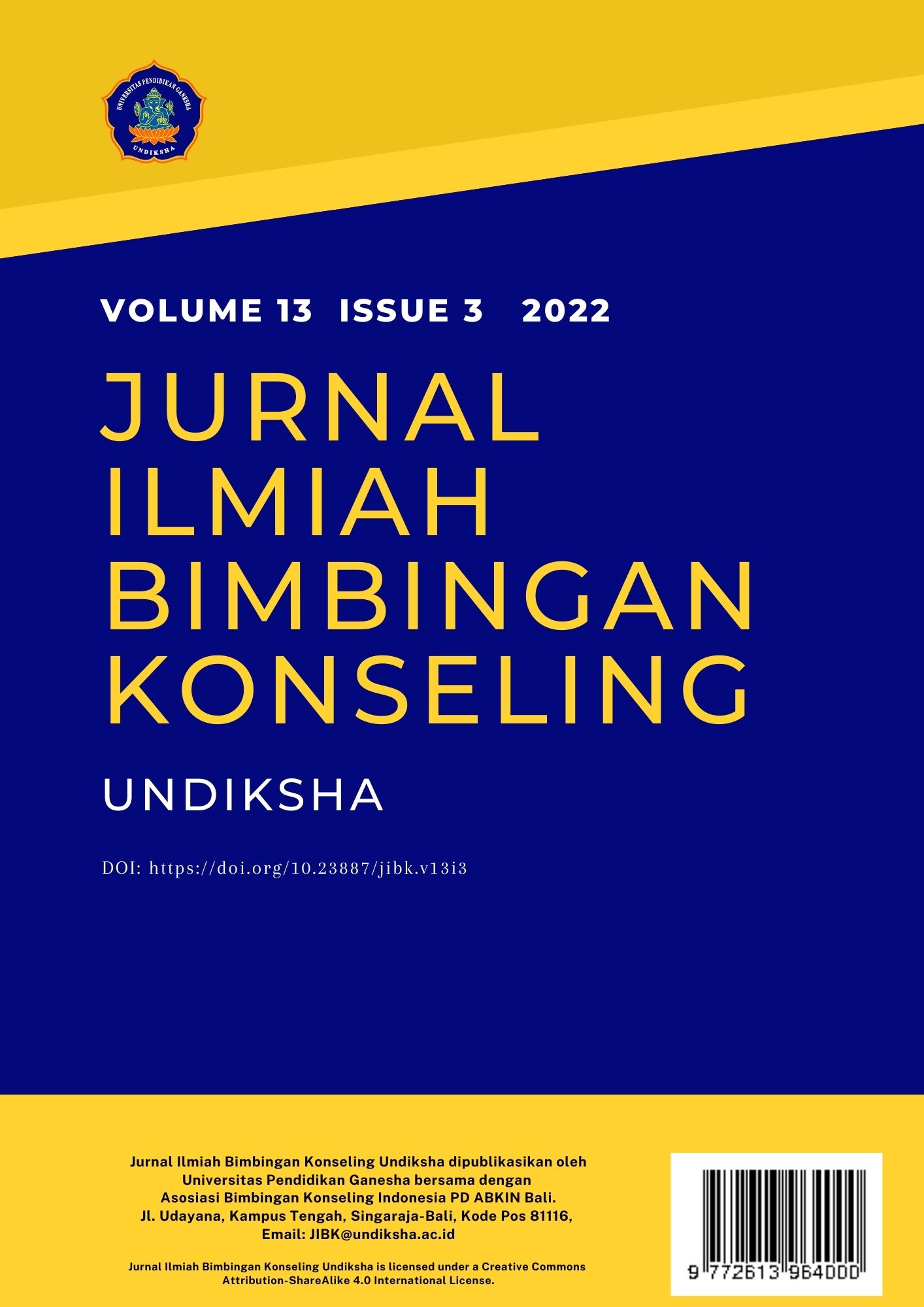Hubungan antara optimisme dan Adversity Intelligence pada siswa kelas X SMA Virgo Fidelis Bawen
DOI:
https://doi.org/10.23887/jibk.v13i3.40767Kata Kunci:
Class X students, Optimism, Adversity IntelligenceAbstrak
This study aims to determine the relationship between Optimism and Adversity Intelligence. The participants were students of class X at SMA Virgo Fidelis Bawen with a total of 70 people. Data collection uses an Optimism scale consisting of 28 items and an Adversity Intelligence scale consisting of 27 items, and both have met the requirements of good reliability. Data analysis using Pearson correlation technique. The results of this study show a correlation coefficient of 0.846 with a significance value of 0.000 (P < 0.05), meaning that there is a significant positive relationship between optimism and adversity intelligence in class X students at SMA Virgo Fidelis Bawen. Through this research, it is hoped that it can help Virgo Fidelis Bawen High School to increase Optimism for class X students so that the students' Adversity intelligence increases, one of which is by providing information related to the relationship between Optimism and Adversity Intelligence.Referensi
Azwar, S. (2017). Metode penelitian psikologi edisi II. Yogyakarta: Pustaka Pelajar.
Diananda, A. (2019). Psikologi remaja dan permasalahannya. ISTIGHNA: Jurnal Pendidikan dan Pemikiran Islam, 1(1), 116-133. DOI: https://doi.org/10.33853/istighna.v1i1.20
Hariska, C., Akbar, S. N., & Erlyani, N. (2020). Hubungan optimisme dengan kecerdasan adversitas pada masyarakat yang tinggal di daerah rawa desa pandahan kecamatan bati-bati. Jurnal Kognisia: Jurnal Mahasiswa Psikologi Online, 3(1), 6-14.
Mukaromah, A. (2018). Hubungan antara optimisme dengan Adversity Quotient pada mahasiswa Psikologi yang sedang menyusun skripsi. Skripsi. Malang: Universitas Islam Negeri Maulana Malik Ibrahim.
Muslimah, I., & Satwika, Y. W. (2019). Hubungan antara optimisme dengan adversity quotient pada siswa kelas xi sma negeri 2 pare. Character: Jurnal Penelitian Psikologi, 6(1).
Seligman, M.E.P. (1991). Learned optimism. New York : A.A knopt. Inc.
Seligman, M.E.P. (2008). Menginstal Optimisme (edisi terjemahan). Translated by Budhy Yogapranata. 2008. Bandung: PT Karya Kita.
Seligman, M.E.P. (2008). Menginstal optimisme. Bandung: Momentum.
Seligman, M.E.P. (2010). The optimistic child. New York: Houghton Mifflin Company.
Shabrina, N. B. U. (2018). Optimisme dan Adversity Quotient pada Remaja Panti Asuhan di Yogyakarta. Skripsi. Yogyakarta: Universitas Islam Indonesia Yogyakarta
Stoltz. (2000). Adversity Intellengence. Liberty: Yogyakarta.
Stoltz. (2000). Adversity quotient, mengubah hambatan menjadi peluang. Alih Bahasa : Hermaya T. Jakarta: PT Grasindo.
Stoltz. (2004). Adversity Quotient: Mengubah hambatan menjadi peluang. Jakarta: PT Grasindo.
Sugiyono, (2010). Statistika untuk penelitian. Bandung: Alfabeta.
Sugiyono. (2007). Metode penelitian kuantitatif kualitatif dan r&d. Bandung: Alfabeta.
Surekha. (2001). Adversity Intellengence. Pustaka Umum: Jakarta.
Syarafina, S. O., Nurdibyanandaru, D., & Hendriani, W. (2019). Pengaruh optimisme dan kesadaran diri terhadap adversity quotient mahasiswa skripsi sambil bekerja. Cognicia, 7(3), 295-307. DOI: https://doi.org/10.22219/cognicia.v7i3.9013
Utami, H. K.(2014). Hubungan optimisme dengan adveristi quotient pada mahasiswa program studi psikologi fakultas kedokteran uns yang mengerjakan skripsi. Jurnal Ilmiah Psikologi candrajiwa, 2(5).
Unduhan
Diterbitkan
Terbitan
Bagian
Lisensi
Hak Cipta (c) 2022 Bagus Setyadi, Christiana Hari Seotjiningsih

Artikel ini berlisensi Creative Commons Attribution 4.0 International License.
Jurnal Ilmiah Bimbingan Konseling Undiksha is an Open Access Journal. The authors who publish the manuscript in this journal agree to the following terms:
JIBK is licensed under a Creative Commons Attribution 4.0 International License. This permits anyone to copy, redistribute, remix, transmit and adapt the work provided the original work and source is appropriately cited.
This means:
Jurnal Ilmiah Bimbingan Konseling is licensed under a Creative Commons Attribution 4.0 International License.
(1) Under the CC-BY license, authors retain ownership of the copyright for their article, but authors grant others permission to use the content of publications in JIBK in whole or in part provided that the original work is properly cited. Users (redistributors) of JIBK are required to cite the original source, including the author's names, JIBK as the initial source of publication, year of publication, volume number, issue, and Digital Object Identifier (DOI); (2) The authors are the copyright owner of the article, and the author grants the JIBK held the first publication right.









.png)

.jpg)
